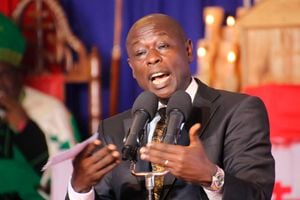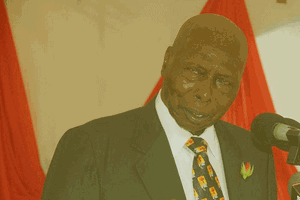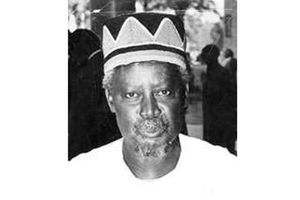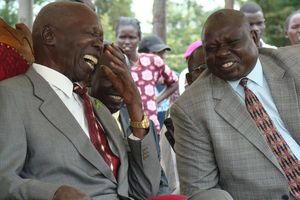
Deputy President Rigathi Gachagua.
In 1975, Vice President Daniel arap Moi returned to Nairobi from an Organisation of African Unity summit in Uganda, only to be blindsided by a shocking accusation: That he was plotting to overthrow the Kenyatta government. This mischievous charge, now long forgotten, was fueled by the looming Kenyatta succession.
Moi knew it was the handiwork of Cabinet ministers Dr Njoroge Mungai and Mbiyu Koinange, two ambitious men with their eyes set on the presidency. The Kenyatta loyalists, known as the Kiambu mafia, and their successors relied on an age-old adage: "Throw dirt enough, some will stick." This was a classic move in the ruthless game of power, where deception and scandal were wielded like weapons to undermine rivals.
The adage had been applied before on Vice President Jaramogi Oginga Odinga, and it had worked perfectly as Tom Mboya, Kenyatta’s minister of Justice and Constitutional Affairs, was used to undermine Jaramogi. Like Moi after him, Odinga was accused of plotting to overthrow the Kenyatta government and keeping arms. Of course, some arms were found at the basement of Jogoo House – but they had been stored there with Kenyatta’s knowledge. If this sounds familiar to the predicament facing Deputy President Rigathi Gachagua and his allies, it is because history does repeat itself, “first as a tragedy, and then as a farce” according to Karl Marx. We have culturalised the dethroning of Vice (Deputy) Presidents – and it is now part of our political drama. The script is the same.
Today, Gachagua looks helpless; the bravado is gone. He is in that situation where Moi watched helplessly as the Koinange-Mungai axis mobilised the Rift Valley police chief James Mungai to search for imagined weapons. They raided Moi’s Nakuru Oil and Flour Mills and Kabarak home. They also raided his Nairobi office and conducted searches in some sugar-cane plantations near Kisumu. Though they found no weapons, they had found a working narrative – enough to portray Moi in a bad light. That sounds familiar in the Gachagua case and where his allies are accused of “sponsoring goons” during the recent Gen Z uprising.
Though a weakling, Moi had the support of Attorney-General Charles Njonjo, and Finance minister Mwai Kibaki. He had also brought several central Kenya politicians to his side, not because they loved him, but because they were opposed to the Kiambu elite. He had also mobilised the massive Rift Valley population to his side. The trouble with Gachagua is that he is being fought from within his backyard too and must look for a victim card to survive.
Politicians love to bring down one of their own. If Jaramogi was watching Moi’s predicament, he would have called it karma. Once upon a time, in 1965, Moi had laughed as Jaramogi was slowly dethroned from power and reduced to a Minister without Portfolio. Moi never thought he would face the same. When the “Corner Bar Group” – a faction of MPs opposed to Odinga – was conceptualised, it was Moi who assured them they had Kenyatta’s patronage. As Moi later admitted, “a delegation of MPs had visited Kenyatta to warn him that Parliament and key sections of the administration were being systematically taken over by Odinga and his clique.” According to Moi, Kenyatta then gave them permission to oppose Odinga, promising to organise Cabinet ministers to back them. What that means is that Gachagua’s battles are emanating from his boss.
We all know that Tom Mboya was the mask behind Odinga’s fall. Behind the mask was Jomo Kenyatta. Mboya chaperoned the anti-Odinga wing within Kanu and was used by the Kiambu elite to bring down the Vice President. It was Mboya who alleged that Odinga was plotting against Kenyatta through the Lumumba Institute, the Kanu training school in Ruaraka. Mboya succeeded, but his success also left his ambitions exposed. In 1969, he was assassinated.
What am I saying? Succession games are maddening, deadly and lack human face. On at least two occasions, the Rift Valley police chief James Mungai slapped Moi in the face in front of President Kenyatta at State House, Nakuru, according to Andrew Morton, the Moi biographer. More so, “Moi’s motorcade was regularly stopped and searched by Mungai’s men outside Nakuru as he was returning to his home or to his constituency. Mungai’s men regularly camped near Moi’s farmhouse at Kabarak to monitor his movement and often placed roadblocks at night on the roads that he would be taking on his way from Nakuru.”
At one point, Moi was summoned to State House in Nakuru to meet Mzee Kenyatta in the evening, but Rift Valley Provincial Commissioner Isaiah Mathenge intentionally made him wait. Mathenge allowed several other groups to meet the President while Moi waited patiently in the anteroom. When Kenyatta inquired about who was still waiting, Mathenge responded, “There’s only Moi here.” It was against this backdrop that the 1976 change the constitution debate took place; a bid fronted by the Kiambu elite to block Moi from succeeding Kenyatta. Woe unto Gachagua’s tormentors if he ever gets to power. When Moi became President, James Mungai fled to exile by escaping through Juba – and had to plead to come back home. Koinange lost his Kiambaa seat and died shortly, while Dr Mungai’s presidential ambitions came to an end. Even minions like Kihika Kimani, Chairman of Ngwataniro Mutukanio Land Buying Company, left for exile.
We also had the familiar case of Mwai Kibaki who was humiliated and demoted from a Vice President to Minister for Health. After the fall of Charles Njonjo, Moi devoted some of his political activity between 1984 and 1988 to undermine Kibaki and limit his influence to Nyeri. Kibaki was restricted to his Othaya constituency and by the 1985 Kanu elections, the attacks on Kibaki had turned personal and Foreign Minister Elijah Mwangale was openly campaigning to be appointed the Vice-President, arguing that Kibaki lacked national stature. Nyeri politician, Waruru Kanja would describe Kibaki’s elite friends as ‘home-guards”, an insult in the Mt Kenya region. But it was Dr. Josephat Njuguna Karanja who would be appointed to replace Kibaki – as a stop gap Vice President. After a few months, Dr Karanja was accused in Parliament of arrogance and importing three million gunny bags from Bangladesh and receiving money from Uganda to undermine President Moi. On April 25, 1989, David Mwenje, the late former Embakasi MP moved a motion of no-confidence against Karanja. During the debate, the VP was described as a ‘kneel before me,’ arrogant, corrupt leader who was anti-Nyayo (disloyal to the President).
Then came Prof. George Saitoti who had been brought in by the Rift Valley mafia. As Moi’s vice-president since 1988, Prof. Saitoti thought he had an upper hand in the Moi succession as the country’s second senior-most politician. But Moi had other thoughts on him. When the time came, Moi plotted Saitoti’s fall and openly told him that friendship and leadership are two different things. At one point, Moi ruled without a Vice President after he refused to name Prof. Saitoti. He then appointed him with a roadside declaration.
Rigathi Gachagua – as Ruto came to realise – must know that in that position, he has to either fight, or those politicians opposed to him will bring him down. Retreating to Mt Kenya will only damage his national standing but that seems to be his only strategy. When Gachagua reinvigorated Mt Kenya politics by resurrecting Odinga-phobia, turned against his ally Uhuru Kenyatta, played the anti-Jomo card, and stirred Mau Mau emotions, all while envisioning himself as the region’s kingpin, some of us asked him to slow down on the tribal card and read history. But others waved the ‘truthful man” on as he burnt his bridges. Now, the curse of the unwanted Deputy President has caught up with him, faster than I anticipated. His ambitions, it seems, will be his Waterloo. The Odinga he satanised, is now the blue-eyed boy of the Ruto regime. If Uhuru brought Odinga to neutralize Ruto’s ambitions, President Ruto has also brought him to neutralise Gachagua.
If there is any writing on the wall, it is all clear. The Mathira man is in troubled waters and is following the same path that others before him passed. The questioning of his supporters by the Directorate of Criminal Investigation is part of this drama – and it is a replay of what Moi and Odinga went through. Whether he withers like Odinga or manages to survive like Moi, Kibaki, and Ruto will depend on how he plays his political games. The graveyard of politicos who were emptied into the dustbins of history has many tombstones and there are lessons that Gachagua can learn from their history.











